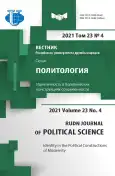Transforming the Party Identity of German Radical Right: In Search of Female Support
- Autores: Burmistrova E.S.1
-
Afiliações:
- Perm State University
- Edição: Volume 23, Nº 4 (2021): Identity in the Political Constructions of Modernity
- Páginas: 706-718
- Seção: IDENTITY IN EUROPE AND ITS ACTORS
- URL: https://journal-vniispk.ru/2313-1438/article/view/322104
- DOI: https://doi.org/10.22363/2313-1438-2021-23-4-706-718
- ID: 322104
Citar
Texto integral
Resumo
The crises of the beginning of the 21st century changed the political landscape of modern Germany, which was manifested in increasing right-wing radicalism. As the party identity of the far-right transforms, they shift from being marginal nationalist anti-migrant forces, contradicting the democratic culture of Germany, to movements which defend identity and rights, including women’s rights. Thus, the far-right in Germany claim to become a part of the civic culture that includes the right to criticize and disagree with the government’s policies. The article examines how far-right parties interact with the female electorate on the example of the Alternative for Germany party. The study highlights the main activities of the Alternative for Germany in attracting women’s votes, based on the analysis of the party’s political program, interviews with party members and media materials. These activities include the orientation towards the socio-economic issues, concerning women, the consideration of the migrant problem through the prism of the Muslim threat towards women, the protection of the interests of conservative women, the attraction of women as party leaders. The author pays a special attention to female right-wing activists, as independent actors in the political life of Germany. Based on the cases of Beate Zschäpe, Francisca Berit and #120db movement, the following interests of female activists were determined: opposing to gender mainstreaming, which threatens the traditional family structure, and opposing to Islam as a source of violence against women. Alternative for Germany aims at strengthening its positions among all women, whose rights are an integral part of European identity, therefore, the actualization of women’s involvement in the movement becomes not only instrumental, but also of value nature. More radically oriented female activists get involved in the European Identitarian movement.
Palavras-chave
Sobre autores
Ekaterina Burmistrova
Perm State University
Autor responsável pela correspondência
Email: burmi-k@yandex.ru
ORCID ID: 0000-0002-4418-8557
Assistant at Department of History and Archeology
Perm, Russian FederationBibliografia
- Albertazzi, D., & Mueller, S. (2013). Populism and liberal democracy: Populists in government in Austria, Italy, Poland and Switzerland. Government and Opposition, 48(3), 343–371. doi: 10.1017/gov.2013.12
- Almond, G.A., & Verba, S. (2020). The Civic Culture: Political Attitudes and Democracy in Five Nations. Litres, 2020.
- Art, D. (2007). Reacting to the Radical Right. Party Politics, 13(3), 331–349. doi: 10.1177/1354068807075939
- Campbell, R. (2016). Representing women voters: The role of the gender gap and the response of political parties. Party Politics, 22(5), 587–597. doi: 10.1177/1354068816655565
- Celis, K., & Erzeel, S. (2017). The complementarity advantage: Parties, representativeness and newcomers’ access to power. Parliamentary Affairs, 70(1), 43–61. DOI: doi.org/10.1093/pa/gsv043
- Decker, F. (2008). Germany: right-wing populist failures and left-wing successes. In Twenty-First Century Populism (pp. 119–134). Palgrave Macmillan, London. doi: 10.1057/9780230592100_8
- Doerr, N. (2021). The Visual Politics of the Alternative for Germany (AfD): Anti-Islam, Ethno-Nationalism, and Gendered Images. Social Sciences, 10(1), 20. doi: 10.3390/socsci10010020
- Drüeke, R., & Klaus, E. (2019). Die Instrumentalisierung von Frauen* rechten in rechten Diskursen am Beispiel der Kampagne# 120db. GENDER–Zeitschrift für Geschlecht, Kultur und Gesellschaft, 11(3), 84–99. doi: 10.3224/gender.v11i3.06
- Ebner, J., & Davey, J. (2019). How Women Advance the Internationalization of the Far-Right. In Perspectives on the Future of Women, Gender, and Violent extremism (pp. 32–39), Washington, D.C.: George Washington University.
- Ford, L.E. (2018). Women and politics: The pursuit of equality. Routledge.
- Mayer, N. (2015). The closing of the radical right gender gap in France? French Politics, 13(4), 391–414. doi: 10.1057/fp.2015.18
- McKay, J. (2004). Women in German politics: still jobs for the boys?. German Politics, 13(1), 56–80. DOI: 0964400042000245398
- Spierings, N., & Zaslove, A. (2015). Gendering the vote for populist radical-right parties. Patterns of Prejudice, 49(1–2), 135–162. doi: 10.1080/0031322x.2015.1024404
- Spierings, N., & Zaslove, A. (2017). Gender, populist attitudes, and voting: explaining the gender gap in voting for populist radical right and populist radical left parties. West European Politics, 40(4), 821–847. doi: 10.1080/01402382.2017.1287448
- Zick, A., Krause, D., & Küpper, B. (2016). Rechtspopulistische und rechtsextreme Einstellungen in Deutschland. In Gespaltene Mitte-Feindselige Zustände: Rechtsextreme Einstellungen in Deutschland 2016 (hrsg. für die Friedrich-Ebert-Stiftung von Ralf Melzer). doi: 10.1007/978-3-531-19085-3_4
Arquivos suplementares









